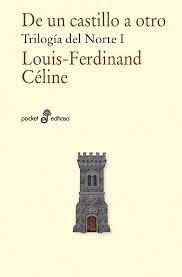
Complicated to separate work and author in the case of a type like Louis-Ferdinand Céline. Vichy’s furious and collaborator of the Vichy Government, its importance in the French and World Literature of the twentieth century and its influence on future generations of writers (the entire generation Beat, Michel Houellebecq, etc.) is undeniable. Come on, another sample (and you do not make me give names but there are all race, gender, age, ideology, etc.) that being a true son of a bitch is not at odds with being a fucking genius in the artistic.
And even if it is complicated, even more after reading the 100-150 pages of the book, I will try that my valuation of the work is not too affected by other types of considerations outside the purely literary. To mess!
From one castle to another, First part of the Trilogy of the North, it is, as with a good part of Céline’s work, an autobiographical narrative. On this occasion, the author recalls, mainly, the past months in Sigmaringen, where they fled in 1944 Jerifaltes (and not so Jerifaltes) of the Vichy collaborative government.
I say mainly because the first 100-150 pages are located at the time Céline writes From one castle to another And because these are a constant diatribe against everything and against all (editors, intellectuals, writers, politicians, etc.) and an almost permanent complaint about their political and economic situation. Thus, Céline is self -demolish Turkish head of the racists in front o material for propaganda, He complains bitterly from the price of carrots (???), protest because With how little I have written, you have already seen the hatreds! … the resentment that I have won! … (Why will it be, Luisfer?) Would it result in comic, if we did not know the character’s background.
In summary, Céline Narrator and Céline, almost absolute protagonist of a first third of the text in which, fortunately, Céline shows, at times, autoparadical, aphoristic, ironic or acidic. If it weren’t for those moments, they want to leave the book, really.
The thing improves, and much, when it focuses on the months of Sigmaringen. While being a messy narrative, without continuity and only apparently Desaliñada, the focus passes from Céline to many of the characters that swarm by Sigmaringen. His condition as a doctor allows him to rub shoulders with characters such as Petain or Laval, with soldiers, prostitutes, etc. and offers a terrible painting of chaos reigning in those days.
The text becomes the portrait of physical and moral ruin. There is no heroicity, but human beings and their lowest passions (betrayals, deletions, cross hatred, hypocrisy) amid hunger, disease and tension of allied bombing and the next presence of the Lecrerc army. But among the ruin, black or eschatological humor sin From one castle to another It is a testimony with a brutal force.
I can’t finish the review without talking about Céline and Translation style. As for the style, and as is the case in Trip at the end of the night (I think I have read it a couple of times, but the last one equal 20 years ago), this is based on orality and an apparent impulsivity, as well as the rupture of the usual standards in terms of narrative continuity, syntax, etc. To put it in images, From one castle to another It looks like a puzzle that would have been transcribed by Lili, Céline’s partner, while this rant and remembers sitting at a table, taking some tintorros and pasteing punch from time to time.
Linked to the above, it is forced to talk about translation because … how to translate such an oral / colloquial text written in 1957? Have these texts adapt to more “current” colloquialisms so that it does not sound “old”? I do not have the answer, only a paragraph of the translation of Carmen Kurtz (1972) and that of Carlos Manzano (2024). Eye to differences!
I would like to see Louis XIV with a “social insured” … I would see if the state is him! Oh, Luis, narrow road helpless! … Realize, Luis Sol, trembled when he had to change surgeon! I no longer lived! … The label! … Your “insured” does not go with little ones to send you to shit! Try to rotting chop!. (CK 1972)
I would like to see Louis XIV with a “social insured” … I would see if the State is him! Oh, Luis, Mindundi! … Imagine, Luis Sol, Canguelo just for changing surgeon! I couldn’t live! … The label! … What brings without care to your “insured”! Send you to take wind! Try to you macarra Canalla! (Cm 2024)
Also from Céline in Ulad: War and trip at the end of the night
Source: https://unlibroaldia.blogspot.com/2025/06/louis-ferdinand-celine-de-un-castillo.html


